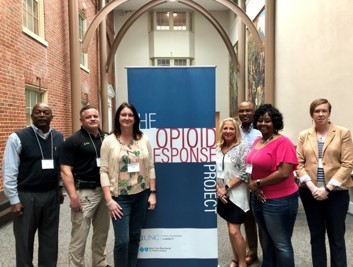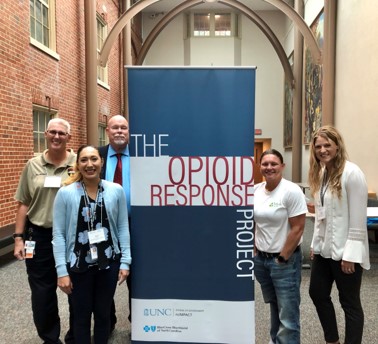Opioid Response Project Team Focus: Onslow County
Learning and networking at forums through the Opioid Response Project has been extremely valuable to the learning and planning process.

Co- Author: Mary Parry
Sparked by the UNC Opioid Response Project, a local effort formed in Onslow County and conversations about launching a collaboration began. Before long, around 30 agencies and partners were on board, eager to build a community team focused on solutions. “Because of the Opioid Response Project grant, we were able to launch our Strategic Opioid Advanced Response Team (SOAR),” said Sophia Hayes, project coordinator with the Onslow County Health Department. “We’re now partnering with physicians, mental health specialists, religious groups, and others, working with a shared purpose. It’s exciting!”
The team’s initial goal was increasing education and awareness. They began by offering a survey to find out how much the community knew about drug problems in the county. They also distributed educational materials, offering local statistics and resources for treatment to help more people seek help when they need it. The outreach response was strong. “We received 400 survey responses and handed out materials to 2,000 people,” said Hayes. “We’re also working on a public service announcement to help this information spread further.”
The team hosts and participates in community events to broaden awareness in the county. One event featured a speaker on the long-term effects of opiates. Provider trainings are also planned, educating the medical community on alternatives to subscribing opioids, policies surrounding opioids, and other emerging topics like the use of CBD oil. These trainings are intended to help patients, too. “There are a lot of worries around prescribing and treatment that we can help alleviate by better educating our community,” said Victoria Reyes, community relations officer with the Onslow County Health Department.

Team leaders point to the Opioid Response Project grant as instrumental in helping them reach people in a targeted way. Becoming more strategic on social media and offering local content specific to Onslow County helped the community better understand the opioid epidemic and the resources available to people in need of support.
The SOAR Team’s initial work in the community has been well-received, but stigma creates a barrier for residents who need help but fear judgment. To help remove this barrier, the team started a Naloxone Take Home Program, allowing residents to pick up the opioid overdose reversal medication at the pharmacy for no cost. “Our EMS also leave take-home kits after cases involving overdose, trying to remove the barrier of stigma,” said Hayes. “This helps more people access Naloxone, but it does skew our data since this Naloxone use is underreported.”
Moving into 2020, Onslow’s SOAR Team works on turning survey results into new opportunities for education and collaboration. With help from the Onslow County Manager, a crisis continuum group joined the team and partners from Carteret County connected as well. Community partners share stories that convey the impact of the SOAR Team’s work, which helps spread the word and build momentum for their efforts.
Because of their early success as part of the Opioid Response Project, the City of Jacksonville received a Comprehensive Opioid Abuse Program grant (COAP) worth $900,000 over a 3-year period. “We’re starting to be able to look beyond the early stages of this work into next year, three years out, and into the future, which is very exciting,” said Hayes.
With continued funding in place, the SOAR Team hopes to provide peer support specialists in the community, who are people with lived experiences that offer valuable input to team leaders. They are also trusted messengers within the community, attending work groups and faith-based gatherings to broaden awareness. “This work is near and dear to their hearts and their impact is real,” said Reyes. “Funding for peer support specialists is needed so that we can provide resources like transportation. In a county like Onslow, where people are so spread out, a lot of travel is required to get to sober living and detox facilities.”
Providing equal access to treatment drives members of the SOAR Team. Coming together with this shared purpose, community leaders are thankful for the opportunity to do this work together. “The support we have received through the Opioid Response Project has been great, providing some structure and helping us uphold the collaboration so it can grow and reach further across our county,” said Reyes.
Learning and networking at forums through the Opioid Response Project has been extremely valuable to the learning and planning process, according to team leaders. “Even though we all live in different areas of the state, we’re all dealing with the same issue,” said Hayes. “Access to leaders in different counties has been both helpful and reassuring as we continue on this path, helping our community respond to the opioid epidemic.”
The team is excited to think about how far they have come because of their collaboration. “We have had tremendous attendance and participation by local leaders, which has been a terrific benefit to our team,” said Hayes. “It has made a tremendous difference in our progress. We look forward to continuing this important work.”
To learn more about the Opioid Response Project coordinated by the ncIMPACT Initiative, please visit: https://www.sog.unc.edu/opioidresponseproject

